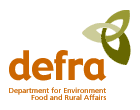UK Department for Environment, Food and Rural Affairs
 From Citizendium - Reading time: 4 min
From Citizendium - Reading time: 4 min

The Department for Environment, Food and Rural Affairs (Defra) is the government department responsible for environmental protection, food production and standards, agriculture, fisheries and rural communities in the United Kingdom. Formal agreements[1] also establish the frameworks for co-operation between Defra and the Scottish Government,[2] the Cabinet of the National Assembly for Wales[3] and with representatives from the Northern Ireland Assembly,[4] which have delegated responsibilities for these matters in their respective nations.
Defra is also responsible for representing the UK at the European Union on agricultural, fisheries and environment matters and in other international negotiations on sustainable development and climate change, although a new Department of Energy and Climate Change was created in 2008 to take over this responsibility.
The headquarters of Defra are located at Nobel House in Smith Square, London, England.
History[edit]
Defra was formed in June 2001 when the Ministry of Agriculture, Fisheries and Food (MAFF) was merged with part of the Department of Environment, Transport and the Regions (DETR) and with a small part of the Home Office. The department was created after the perceived failure of MAFF to deal adequately with the 2001 outbreak of Foot and Mouth disease.
The Department had about 10,479 personnel as of January 2010.[5]
In October 2008, the climate team at Defra was merged with the energy team from the Department for Business Enterprise and Regulatory Reform (BERR) to create the Department of Energy and Climate Change.[6]
Responsibilities[edit]
Defra is responsible for the UK Government's policy in the following areas:[7]
|
Organization[edit]
The Secretary of State for Environment, Food and Rural Affairs, with the assistance of the Minister of State for Food, Farming and Environment, has the overall leadership responsibility for all aspects of Defra.[8]
The day-to-day executive management of the department is provided by:
- The Permanent Secretary: Responsible for the overall organization, management and staffing of the department as well as for all financial and other procedures. Also chairs a Supervisory Board comprised of:[9]
- Director General: Chair of the Central Approvals Panel
- Director General: Strategy and Evidence Group
- Director General: Food and Farming Group
- Director General: Environment and Rural Group
- Chief Scientific Advisor: Provides ministers with the best possible scientific advice. Assures that science and technology are used to inform policy. Also supports the UK Government’s scientific work on minimising the effects of climate change and improving sustainability by promoting consistency across Defra and working together with other government departments.[10] Assisted by a Science Advisory Council (SAC) consisting of a chairperson and seven members, all of whom are professors in various UK universities.
Executive agencies[edit]
The executive agencies within Defra are:[11]
- Animal Health and Veterinary Laboratories Agency
- Centre for Environment, Fisheries and Aquaculture Science
- Food and Environment Research Agency
- Rural Payments Agency
- Veterinary Medicines Directorate
Key delivery partners[edit]
The key delivery partners are:
- British Waterways
- Covent Garden Market Authority
- Environment Agency
- Forestry Commission
- Natural England
- Marine Management Organisation
- Sea Fish Authority
A full list of departmental delivery and public bodies may be found on the Defra website.[12]
Defra in the English regions[edit]
Policies for environment, food and rural affairs are delivered in the English regions[13] by Defra's executive agencies and delivery bodies, in particular Natural England, the Rural Payments Agency, Animal Health and the Marine Management Organisation.
Defra provides grant aid to the following flood and coastal erosion risk management operating authorities:
Aim and strategic priorities[edit]
Defra's primary aim is sustainable development, which is defined as "development which enables all people throughout the world to satisfy their basic needs and enjoy a better quality of life without compromising the quality of life of future generations."
Under this primary aim, Defra has five strategic priorities:[14]
- Climate change and energy.
- Sustainable consumption and production, including responsibility for the National Waste Strategy.
- Protecting the countryside and natural resource protection.
- Sustainable rural communities.
- A sustainable farming and food sector including animal health and welfare.
References[edit]
- ↑ Note: The formal agreements are referred to as "Concordats".
- ↑ Main Concordat between the Ministry of Agriculture, Fisheries and Food and the Scottish Executive
- ↑ Concordat between MAFF and the Cabinet of the National Assembly for Wales
- ↑ Subject specific Concordat between MAFF and the Scottish Executive on fisheries
- ↑ Defra Departmental Report 2009 (see Table 6 on page 228)
- ↑ Marrying energy demand and supply, BBC News, 3 October 2008.
- ↑ List of Ministerial Responsibilities, July 2010 (see pages 28-39)
- ↑ Ministers
- ↑ Defra's Supervisory Board
- ↑ Defra's Chief Scientific Advisor.
- ↑ List of Ministerial Responsibilities, July 2010 (see page 30)
- ↑ Defra's Delivery partners and research centres.
- ↑ Note: There are nine [[Regions of English Regions]], which are the highest level of sub-national governmental entities in England. The nine regions are: Greater London, North East, North West, Yorkshire and the Humber, East Midlands, West Midlands, East, South East and South West.
- ↑ Delivering the Essentials of Life, Defra’s Five Year Strategy (see Annex B). Presented to Parliament by the Secretary of State for Environment, Food and Rural Affairs, December 2004
 KSF
KSF